Is TikTok Shop safe? How to shop smart and protect your data
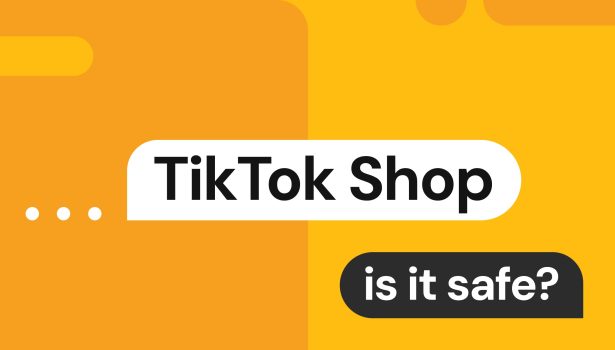
TikTok Shop is an e-commerce platform that is changing the way people shop. Scrolling through a random TikTok and spotting a cool gadget that allows you to seal all your open snack packets? Well, no need to go searching for it. You can now directly buy it from the app.
TikTok Shop is turning entertainment into impulsive shopping decisions that people may or may not regret later. But with how popular it has gotten, there’s one question that everyone keeps asking repeatedly: is TikTok Shop safe?
We believe the most fitting answer to this question is: TikTok Shop is safe if you shop smartly. While it definitely is a legitimate platform, at the end of the day, your safety depends on your own research.
In this guide, we’ll talk about everything you need to know about TikTok Shop before placing an order.
What is TikTok Shop?
TikTok Shop is an e-commerce platform built into the TikTok app which is used to purchase products directly on TikTok. Products can be bought through in-feed videos, live streams, product showcases, and a “Shop” tab on the home screen (in supported regions).
The variety of products available is quite wide and ranges from skincare and clothing to gadgets and even snacks. Since the app is all about viral content, product popularity is mostly driven by TikTok trends and seasonal promotions.
In terms of selling, TikTok Shop is mostly used by influencers and small to medium-sized businesses who showcase items in real-time or as short-form videos. However, big brands are present as well. For example, TikTok Shop’s collaborations with L’Oréal, Olay, and Uniqlo demonstrate that the platform is striving to establish itself as a trustworthy e-commerce channel, at the same time letting the brands engage with younger demographics.
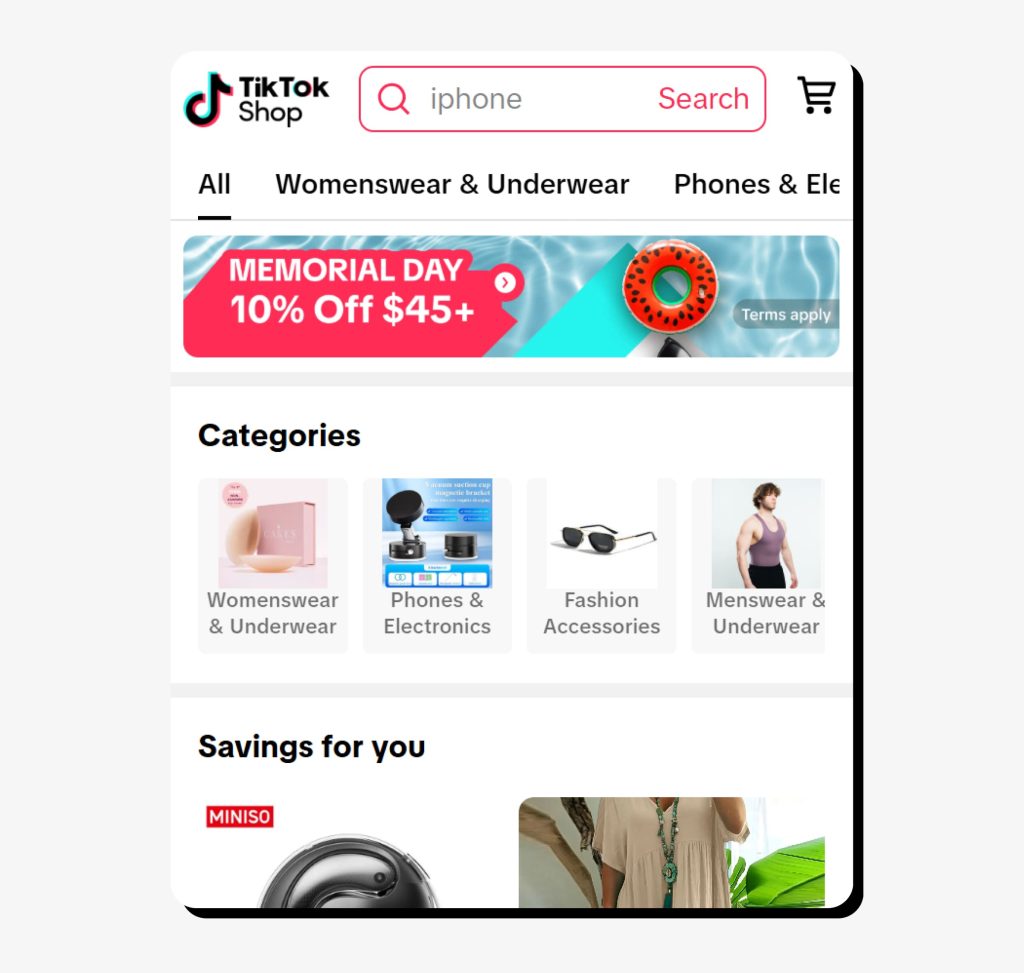
Is TikTok Shop legit?
TikTok Shop is a legitimate platform operated under the management of ByteDance (which is the tech giant behind the main TikTok app). It was first introduced in Southeast Asia and the UK in 2021 before being launched in the United States in 2023.
Seller vetting and verification process
All potential sellers go through a verification process. Basic requirements for individuals include being of age, residing in the US, and having a valid ID. When registering, you’ll also have to provide the last 4 digits of your SSN, a bill that validates your residential address, and a W9 form. If you’re registering as a business, you will have to submit documents that confirm your business eligibility and an employment identification number (EIN).
New shops are subject to a probation period that puts limits on the number of daily orders and product uploads. Once certain requirements, like having a low negative review rate and selling for at least 2 months, are completed, the probation period ends automatically. Sellers get unlimited daily orders, increased product upload capacity, and faster payouts.
Sellers can also apply for a verified badge (blue checkmark) that indicates their credibility. This process is based on other criteria and requires having a significant presence in the field and meeting seller performance standards consistently, among other things.
In addition to that, TikTok continuously checks shops for counterfeit products and policy violations, suspending sellers violating the terms and those with high dispute rates.
Is it safe to buy from TikTok Shop?
Yes, TikTok Shop is safe to buy from—if you stay cautious and do due research instead of buying any item right away.
How to identify reliable sellers
Look for the following signs that indicate that a shop is trustworthy:
- “TikTok Shop” badge or blue checkmark
- High ratings and positive reviews (preferably, with photos)
- Clear product descriptions and brand names
- Clear shipping and return policies
- High customer engagement (not just a large number of followers)
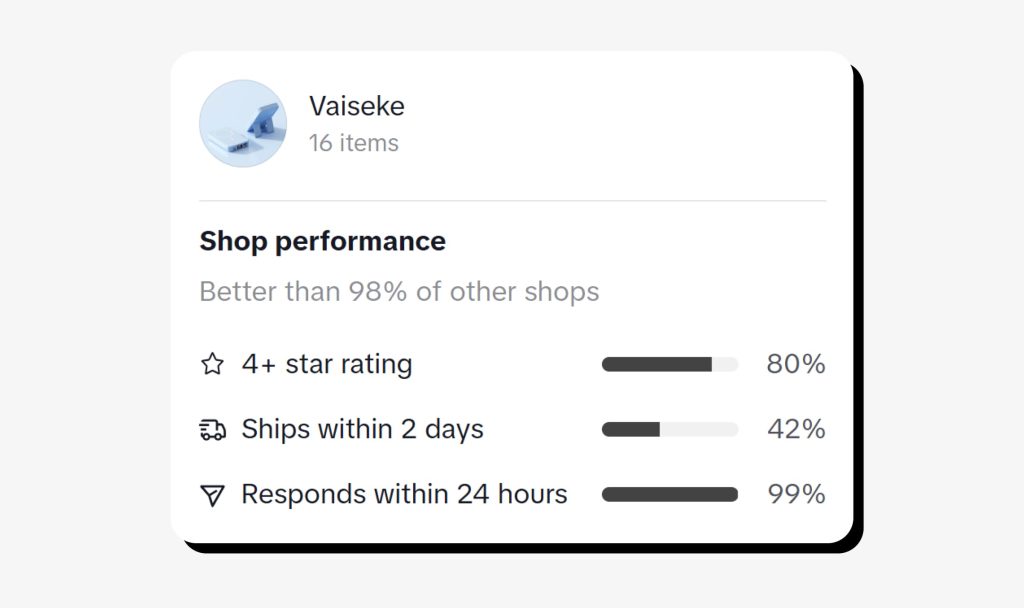
What TikTok does (and doesn’t) guarantee
TikTok provides some buyer protection but there are limitations to what it guarantees.
First, to assist during delivery, the app provides timeframes and order tracking. As for product quality, TikTok’s buyer protection policy provides full refunds for undelivered items and returns for items that don’t match descriptions and are damaged or counterfeit.
In terms of payment security, all transactions are processed through TikTok, not the seller. Additionally, the app doesn’t release payment to the seller right after the purchase but waits until delivery is confirmed.
While TikTok Shop prohibits counterfeit items, it doesn’t inspect every product sold. That means that it can’t guarantee that all goods match their description and are of good quality. However, you can report fake listings and TikTok will investigate.
Moreover, certain aspects are controlled by sellers, not TikTok. In particular, sellers set shipping timeframes, carrier service, return windows and shipping costs, conditions for return, and a couple of other things. While TikTok outlines the overall rules and limitations, the details are up to shops. That means that you need to read every product description carefully so that you have realistic expectations.
User complaints and success stories
If you type “TikTok Shop reviews” on Google, you’ll find mixed ones. At the time of writing this article, TikTok doesn’t have an official account on Trustpilot, but an unclaimed account has a score of 1.4 with over 3100 reviews. While most complaints refer to TikTok itself, many concern the Shop feature. The complaints are left by both buyers and sellers, and range from order delays to poor customer service, counterfeit products, and unfair account suspensions.
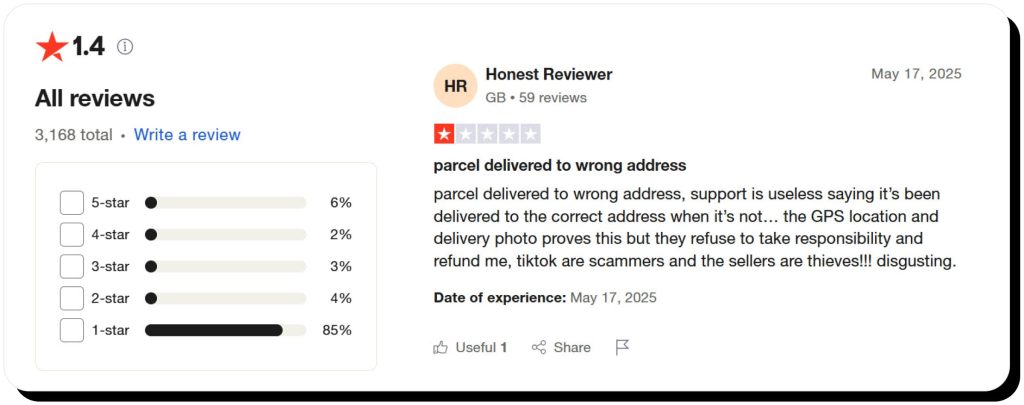
On the flip side, creators and buyers mention good deals on viral beauty products, cheap gadgets, and trendy items.
A Reddit thread from 2023, titled “Is TikTok Shop Legit?” marvels at how cheap everything is on TikTop Shop. The replies are a mixed bunch – some people claim to have been scammed by fake products of poor quality, even going on to call them “garbage,” while others share their positive experiences saying the products they received were worth the money.
So, is TikTok Shop reliable? It can be if you choose your sellers wisely.
Does TikTok Shop steal your info?
TikTok Shop doesn’t steal your info, but the platform does collect a significant amount of data.
According to its Privacy Policy, the app collects:
- The details you provide when creating an account (name, phone number, address, tax info, payment account info, etc.)
- The content of your messages and metadata (when it was sent, received, read, etc.)
- Payment info (card number, billing address, security code, etc.)
- Recordings of phone calls and video conferences
- The data you provide through surveys and questionnaires
- Account performance information
- Device data and usage patterns
- Other details allowed by your permissions
TikTok claims to encrypt payment information in accordance with industry standards, but it doesn’t disclose whether it encrypts other information it collects.
Additionally, TikTok lacks transparency on what third parties user data is shared with. While the app provides a generalized list, there are no specific entities mentioned.
How to limit data sharing
Though you can’t fully stop behavioral tracking and data sharing with third parties, you can adjust in-app settings and device permissions to reduce the amount of data that TikTok collects about you:
- Disable personalized ads (in Settings → Privacy → Ads personalization)
- Limit app permissions (revoke access to your microphone, location, camera)
- Avoid providing optional data or provide dummy details instead
- Limit what you’re sharing during checkout
- Use anonymous payment methods (like PayPal)
- Avoid connecting to other accounts (Google, Apple, etc.)
- Use privacy-friendly browsers such as Brave when shopping outside the mobile app
- Review privacy settings regularly—they can change
Common scams and complaints
No platform is perfect, and TikTok Shop has its fair share of issues. Even though the app has policies in place that protect the buyers, you still need to be wary of the following:
Counterfeit products
Admittedly, TikTok’s seller verification process is less rigorous than that on some other well-established e-commerce sites like Amazon or Etsy. While TikTok is continuously strengthening its vetting process, some scammers find a way to bypass it. This results in fake listings where the knockoff items you get don’t even resemble the videos or images in the product description. This can apply to everything, from fake skincare to tech accessories.
Return policy issues
Some buyers complain about complicated return processes and long wait times for refunds. Meanwhile, sellers complain about how easy to abuse the TikTok return policy is for buyers. TikTok often requires items to be shipped back to overseas sellers, which means expensive shipping on the sellers’ part, even for reasons that are not valid.
For example, a TikTok Shop seller complained on a Reddit thread about a customer returning an opened box item with the reason “missing /broken parts”. When the seller examined the returned item, nothing was missing or broken, causing them to appeal—but TikTok denied it.
Fake reviews and sponsored hype
Some creators do not disclose paid partnerships with brands. This makes it difficult to figure out whether a product is actually good or just hyped up. In addition to that, some sellers purchase fake reviews to gain credibility and look as if they are legitimate and popular.
Sellers disappearing after the sale
One of the most frustrating experiences on TikTok Shop is when a seller vanishes after you’ve made a purchase. You might receive a confirmation and even a tracking number, only to find out later that the item was never shipped, and the seller is nowhere to be found.
Promo codes that don’t work
Many users are lured in by flashy promo codes promising huge discounts, only to find out at checkout that they don’t apply. In some cases, the code has already expired or it only works for a select few products. This bait-and-switch tactic can make the whole shopping experience feel deceptive and frustrating.
Flash sales that are never honored
Flash sales on TikTok Shop often claim to offer limited-time deals that disappear fast. But the reality is that those deals never really existed. Items shown at discounted prices either jump back to full price at checkout or are suddenly “out of stock.”
How to shop safely on TikTok
Here are some practical tips to avoid getting scammed on TikTok Shop and ensure your shopping experience is smooth and successful.
Use trusted payment methods
Use safe payment methods, such as PayPal, Apple Pay, or credit cards that have fraud protection. Make sure you’re paying only through the TikTok platform and are not redirected to any third-party sites.
Avoid clicking suspicious product links
Avoid getting tempted by offers in random comments on TikTok and fishy DMs. Stick to the official shopping tab or creator-tagged products in videos.
Search for external reviews
Always do your research and search the product or seller on other platforms. If a seller is present only on TikTok—take it as a red flag. Also, use sites like Reddit for authentic feedback and check reviews across various platforms.
Check the product description carefully
Go for listings that have clear and detailed product descriptions. Always check the info about material, sizing, shipping, and return policies to set the right expectations. Avoid listings with generic details and a lack of images/ videos.
Use reverse image search
A good idea is to download product images and run them through image search. This will help you check if they are authentic and haven’t been stolen from some other shop or seller.
Don’t fall for overly generous offers
While it’s normal for a product to be on sale, evaluate critically whether the discount is reasonable or too good to be true. Avoid products that claim to be branded but are sold too cheaply as you risk getting a fake item.
Limit what personal information you provide
To reduce the risk of data misuse, avoid oversharing. Skip unnecessary fields when registering, filling out forms, and ordering goods. Consider using dummy data instead of your real DOB, email address, or phone number to protect those from exposure. You can also use temporary emails and numbers to keep your primary ones private.
Rely on Onerep to protect your personal information
TikTok is not the only service that collects a lot of your personal information and shares it with third parties. Numerous apps and websites gather your data and share it across platforms—often without your explicit knowledge. This data, then, finds its way to data brokers that make it easily available online.
Data brokers, AKA people-search sites, collect your personal information from a number of sources and compile comprehensive profiles. Such profiles typically reveal where you live, who you live with, how to contact you, what your interests are, how much you have in assets, and much more. The profiles are published openly and are easily Googleable, revealing your sensitive information to anyone interested.
Onerep helps you regain control and privacy by removing your personal information from 232 people-search sites. The service scans data brokers, finds the exact pages that expose your details, and requests removal on your behalf. Even after you’ve been opted out, Onerep continuously monitors the sites for reappearing profiles, ensuring long-term protection. This proactive approach reduces your digital footprint and reduces the risks of spam, phishing, and identity theft.
FAQs
Can you trust TikTok Shop sellers?
You can trust verified sellers with good reviews and public business information. But be careful when dealing with new or low-rated shops.
Is TikTok Shop a scam or legit?
TikTok Shop is legit. However, it does get abused by scammers who pose as legitimate sellers. It’s important to always thoroughly vet who you’re purchasing from and read product descriptions attentively.
How can I tell if a TikTok Shop listing is safe?
Look for verification badges, real user reviews, and specific product information. If you find a listing that’s vague or looks fake, pass it.
Does TikTok collect your credit card data?
TikTok does collect credit card data, but the platform encrypts it and stores it securely in accordance with industry standards. Importantly, TikTok doesn’t share your credit card data with sellers.



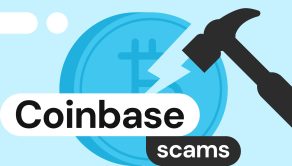

Mark comes from a strong background in the identity theft protection and consumer credit world, having spent 4 years at Experian, including working on FreeCreditReport and ProtectMyID. He is frequently featured on various media outlets, including MarketWatch, Yahoo News, WTVC, CBS News, and others.